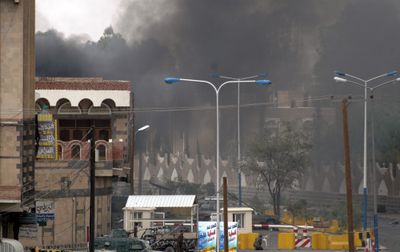Yemen bombings fuel terror worries
Sixteen killed in attack outside U.S. Embassy gate

WASHINGTON – A sophisticated bombing plot carried out against the U.S. Embassy in Yemen brings increased urgency to fears that Muslim extremists are gathering strength in that nation and could make it a headquarters for terrorism.
The attack at the perimeter of the compound, which killed 16 people, including six assailants, follows a March mortar attack on the embassy and two attacks against Yemen’s presidential compound in late April.
“There’s an ongoing issue with al-Qaida and … violent extremists and terrorism in Yemen,” State Department spokesman Sean McCormack said at a news conference Wednesday.
There were no immediate reports of American casualties in Wednesday’s attack. The embassy is in the center of San’a, Yemen’s capital, but the building is set far back from an outer security wall. American officials condemned the attack, noting that the victims were all Yemeni soldiers or civilians waiting for access to the embassy.
“This attack is a reminder that we are at war with extremists who will murder innocent people to achieve their ideological objectives,” President Bush said after a meeting with Gen. David Petraeus. “One objective of these extremists is they kill – they try to cause the United States to lose our nerve and to withdraw from regions of the world.”
Ted Gistaro, the national intelligence officer for transnational threats, said in a speech recently that “Yemen is rapidly re-emerging as a jihadist battleground and potential base of operations.”
The extent of Yemen’s problem with extremists and the shortcomings of its counterterrorism efforts are underscored by the fact that Yemenis make up the largest population of detainees – at least 108 of 270 – held at Guantanamo Bay.
The Bush administration has sought to return dozens of these prisoners to Yemen but has been unable to get assurances from the Yemeni government that they will be held or rehabilitated.
Yemen poses a frustrating problem for U.S. counterterror efforts. It considers itself a strong partner with the United States in the fight against terrorism, and U.S. officials say Yemeni intelligence services have been helpful since the 2000 attack on the USS Cole that killed 17 American sailors. But the poor country on the southern tip of the Arabian peninsula has a weak central government and a powerful tribal system. That leaves large lawless areas open for terrorist training and operations.
“Al-Qaida senior leaders have called for increased pressure in Yemen, and their northern territory is not under central government control,” a senior U.S. military official told the Associated Press Wednesday, on condition his name not be used to discuss sensitive foreign policy issues.
Yemen has a history of being unable to hang onto terrorist suspects. U.S. officials grumble about what they call lax detention policies. Seventeen suspects in the USS Cole bombing were arrested; 10 of them escaped in 2003. One of the primary suspects in the attack, Jamal al-Badawi, escaped jail in 2004. He was taken back into custody last fall under pressure from the U.S. government.
The fallout from that incident reinforced Washington’s concerns about Yemen’s commitment to fighting terrorism and led Secretary of State Condoleezza Rice to cancel a planned visit to Yemen last year for an international conference.
“Have they done a lot in the past? Yes. Could they do more? Yes, absolutely. We want to work with them to build up their capabilities at this point,” said McCormack.
Al-Qaida’s history is intertwined with Yemen. Osama bin Laden’s family came from Yemen. It was home to several al-Qaida training camps in the late 1990s. The USS Cole bombing was one of al-Qaida’s most devastating attacks on a U.S. target before the Sept. 11 attacks.
In June 2001, Yemeni authorities arrested eight Yemenis believed to be plotting to blow up the U.S. Embassy in San’a. In 2002, an accidental explosion killed two al-Qaida operatives. Later that year, three American missionaries were killed in a southern Yemeni town but it is unclear if the alleged killer, a local Islamist militant, had any links to al-Qaida, according to information compiled by the Council on Foreign Relations.
The latest attack so far has not been attributed to al-Qaida, but officials say it follows the terrorist organization’s playbook. The attack involved multiple vehicle-borne devices and armed personnel on foot, seemingly in an attempt to try to breach the embassy’s perimeter, enter the compound and inflict further damage and loss of life.